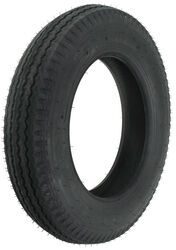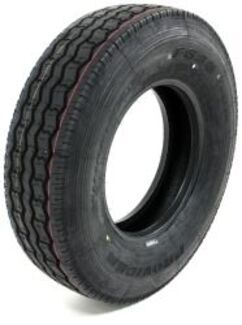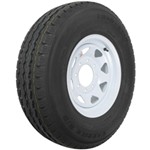
Replacement Special Trailer Tires to Replace Radials on Boat Trailer
Question:
my boat trailer new came with 4 ply raidial car tires I had them for 18 years I bout new ones they are cooper tires but only 2 ply can I use them
asked by: Billly S
Expert Reply:
Trailer tires rarely last much longer than about 6 years and that is the oldest we recommend a tire be before it is replaced. If you got 18 years of service from a set of car tires (!!!) you got lucky, but it surely is time for new ones, and they need to be special trailer tires.
The number of plies in a tire does not matter like it used to. Years back, the ply rating pretty much told you the whole story of a tire's capabilities, but with modern special trailer tires (the only type you should use on your trailer, by the way) the ply ratings no longer matter so much as load range. This is the actual amount of weight each tire can safely handle.
The Kenda bias ply trailer tire you referenced, 4.80-12 tire # AM10062, is a Load Range C tire that can handle up to 990-lbs per tire when installed on a suitable 12 x 4-inch wheel. This tire gives the equivalent of a 6-ply rating (although it doesn't actually use 6 plies in its construction).
Both radial and bias ply tires can be used on a trailer, so long as they are special trailer tires, and so long as you do not mix tire sizes or types. Always keep trailer tires fully-inflated to the psi pressure rating that appears on the tire sidewall. Radials tend to provide better grip and more flex, while bias ply tires are better for handling heavy loads and for off-road use, such as on a farm.
I have linked two helpful articles on trailer tires and also our main page for tires. You can click on the filters on the page to select your wheel diameter, tire size and tire type. I will be glad to help you select replacements if you care to tell me your current tires' size and load range rating.

Product Page this Question was Asked From
Kenda K353 Bias Trailer Tire - 4.80-12 - Load Range C
- Trailer Tires and Wheels
- Tire Only
- Bias Ply Tire
- Load Range C
- 4.80-12
- 12 Inch
- Kenda
more information >
Featured Help Information
Miscellaneous Media

Continue Researching
- Search Results: l44649
- Search Results: carlisle
- Shop: Kenda K353 Bias Trailer Tire - 4.80-12 - Load Range C
- Search Results: 4.8 x 12 trailer tires
- Shop: Kodiak Trailer Wheel Lug Nut - Stainless Steel - 1/2" - Qty 1
- Shop: Trailer Axle with Idler Hubs - 5 on 4-1/2 Bolt Pattern - 60" Long - 2,000 lbs
- Q&A: Availability of a Size 4.80-12 Tire with a Speed Rating Higher than 65 MPH
- Search Results: torque wrench
- Search Results: tie down axle strap
- Video: Performance Tool Torque Wrench Review
- Video: Review of Performance Tool Tools - Hand Tools - Shop Tools - PT79FR
- Video: Review of etrailer by AxleTek Trailer Axles - 2,000 lbs 60 Inch Long Axle with Idler Hubs - e84YR
- Video: Kenda Tires and Wheels - Tire with Wheel - AM30660 Review
- Q&A: Recommended Replacement Tires For Utility Trailer
- Q&A: Does Kenda Trailer Tire and Wheel Come With Lug Nuts
- Q&A: Lug Nut Torque Chart for Trailer Wheels
- Shop: U-Bolt Kit for Mounting 2,000-lb, Round Trailer Axles - 4-1/4" Long U-Bolts
- Shop: etrailer Hitch Pin Alignment Collar for Hitch Accessories - 2" Hitches
- Shop: Dexter Trailer Axle Beam with Standard Spindles - 60" Long - 2,000 lbs
- Shop: Dexter Trailer Axle w/ Electric Brakes - E-Z Lube - 6 on 5-1/2 Bolt Pattern - 86-1/2" - 6K
- Video: Review of etrailer Trailer Hubs and Drums - Hub - AKIHUB-440-2-1K
- Search Results: torque
- Search Results: lug nut torque
- Q&A: Lug Nut Torque for Aluminum Trailer Wheels
- Q&A: 4.80-12 Trailer Tire with 81 MPH Speed Rating
- Article: Trailer Tire Sizing
- Q&A: Recommended Hub Assembly for a Trailer w/ L44549 Bearings
- Video: Review of etrailer 2 Leaf Slipper Spring - e36SR






